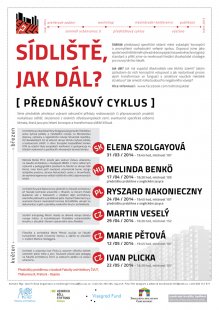
Melinda Benkö as part of the series Settlement, what next?
Housing estates represent specific areas of cities that require conceptual and thoughtful decision-making by public administration. Their spatial structure carries complications in terms of economic and social sustainability. So far, as a society, we have dealt almost exclusively with buildings and their construction technology standards, and we have not focused much on finding a long-term strategy for the development of these locations. Seeking answers to questions about the future development of these specific areas thus represents one of the most important topics in spatial planning and city management.
We would like to invite you to the second lecture in the series Housing estates, what next?, which will take place on Thursday April 17, 2014, at 6:30 PM. The guest will be Melinda Benkö, who will present experiences with the management and regeneration of housing estates in Hungary. The lecture will be held at the Faculty of Architecture of ČVUT in Dejvice, in lecture hall 105, and will be conducted in English.
Melinda Benkö Ph.D. serves as the head of the Institute of Urbanism at the Faculty of Architecture in Budapest-BME. Within her research and teaching activities, she focuses on a number of topics including contemporary urban theories, public space design, renewal of historical centers and brownfields, but especially on the regeneration of large housing complexes and deprived areas.
The lecture is part of an extensive research project “Housing estates, what next?”, organized by the Faculty of Architecture of ČVUT in cooperation with the Centre for Housing Quality, the Heinrich Böll Stiftung Prague Foundation, and the National Network of Healthy Cities. The project is supported by the Visegrad Fund.
The project “Housing estates, what next?” examines the possibilities of transforming existing housing estates into functioning and attractive parts of the urban structure. The project includes a studio assignment in the Kohout-Tichý studio, a student workshop, and a series of six thematic lectures. In the first part of the lecture series, experts from Visegrad countries will present the issues of housing estates in the Central European context, followed by Czech experts among architects, urban planners, and theorists who deal with the topic of housing estates in their work. An international conference is planned for the fall of this year, which will present the results of case studies and analyses developed in the studio, and will also invite guests from Germany, France, and the Netherlands, who will present completed or ongoing regeneration of housing estates in terms of substance (principles) and process (the role of public administration). The project concludes with a traveling exhibition, which will be launched at the Faculty of Architecture of ČVUT and subsequently presented in cities and urban areas that participated in the project. The theoretical knowledge gained during the various phases of the project “Housing estates, what next?” will also be summarized in a publication, which will simultaneously suggest basic recommendations for the transformation of Czech housing estates.
More information >
We would like to invite you to the second lecture in the series Housing estates, what next?, which will take place on Thursday April 17, 2014, at 6:30 PM. The guest will be Melinda Benkö, who will present experiences with the management and regeneration of housing estates in Hungary. The lecture will be held at the Faculty of Architecture of ČVUT in Dejvice, in lecture hall 105, and will be conducted in English.
Melinda Benkö Ph.D. serves as the head of the Institute of Urbanism at the Faculty of Architecture in Budapest-BME. Within her research and teaching activities, she focuses on a number of topics including contemporary urban theories, public space design, renewal of historical centers and brownfields, but especially on the regeneration of large housing complexes and deprived areas.
The lecture is part of an extensive research project “Housing estates, what next?”, organized by the Faculty of Architecture of ČVUT in cooperation with the Centre for Housing Quality, the Heinrich Böll Stiftung Prague Foundation, and the National Network of Healthy Cities. The project is supported by the Visegrad Fund.
The project “Housing estates, what next?” examines the possibilities of transforming existing housing estates into functioning and attractive parts of the urban structure. The project includes a studio assignment in the Kohout-Tichý studio, a student workshop, and a series of six thematic lectures. In the first part of the lecture series, experts from Visegrad countries will present the issues of housing estates in the Central European context, followed by Czech experts among architects, urban planners, and theorists who deal with the topic of housing estates in their work. An international conference is planned for the fall of this year, which will present the results of case studies and analyses developed in the studio, and will also invite guests from Germany, France, and the Netherlands, who will present completed or ongoing regeneration of housing estates in terms of substance (principles) and process (the role of public administration). The project concludes with a traveling exhibition, which will be launched at the Faculty of Architecture of ČVUT and subsequently presented in cities and urban areas that participated in the project. The theoretical knowledge gained during the various phases of the project “Housing estates, what next?” will also be summarized in a publication, which will simultaneously suggest basic recommendations for the transformation of Czech housing estates.
More information >
The English translation is powered by AI tool. Switch to Czech to view the original text source.

0 comments
add comment
Related articles
0
19.05.2014 | Ivan Plicka within the series Housing Estate, what next?
0
12.05.2014 | Marie Pětová within the series Housing Estate, what next?
0
29.04.2014 | Martin Veselý in the context of the series Housing Estate, what's next?
0
24.04.2014 | Ryszard Nakonieczny in the series Housing Estate, what next?
0
24.03.2014 | Housing estate, what next? - lecture series






